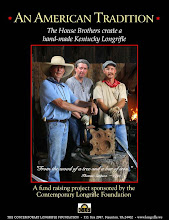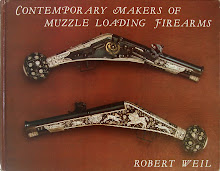Johannes Rupp of Macungie
(A preliminary study, to be updated as necessary)
Part V
Now, let’s revisit old George Rupp’s estate paperwork. It was preliminarily filed October 14, 1807, and I have already covered the initial statement by Herman Rupp as administrator (see above). Following this, the next page notes that “Harman Rupp of Macungie twp, son of deceased George Rupp of said township, and John Fogle, of said township, and Peter {?} of borough of Easton, all of Northampton Co, are bound unto the State of Pennsylvania the sum of one hundred pounds…,” this being dated Oct 14, 1807. Herman Rupp as administrator of estate of George Rupp is expected to make a “true inventory of all goods, chattels, debts…” etc., due by Oct 14, 1808 (one year). More legal blathering continues, some of it unreadable, and it is then signed by Herman Rupp, John Fogle, Abraham {Horn?} and two other signatures that I can’t decipher. So far, so good.
The estate settlement apparently dragged on for a considerable period of time, probably due not only to the lack of a Will but also because of different reasons altogether. Next, there are pages in a different hand dated December 5, 1816. “Herman Rupp appeared before Nathanial {?} register for the probate of wills and granting letters of administration in and for the county of Northampton, swore that all inventory etc for the estate of George Rupp, deceased, was true. Signed by Nathanial {?} Another page then follows in the same handwriting which I assume is that of Nathanial (my underlining added):
“{very difficult to read} of the Estate of George Rupp, late of Macungie County of Northampton, now Lehigh, Yeoman, deceased. The said accountant craves a credit, for the following items, viz:
By lost debts, to wit:
John Rupp’s two bonds, not recovered, he having died insolvent, And… charged…
Total…
Goods and Chattels … charged, which the accountant claims as his property by virtue of a certain agreement between the said George Rupp now dec’d and Herman Rupp the accountant and John Rupp… agreement… John Rupp to Herman Rupp…said agreement is recorded in the office for recording of deeds at Easton in and for the county of Northampton…
(More accounting stuff follows, very hard to read)
Another page follows which appears to be a listing or inventory of items, dated November 27, 1807, but it is difficult to read. There is then a final page:
“…Account of Herman Rupp, Administrator, Macungy township, in the County of Northampton.
The said accountant charges himself with all and singular the goods and chattels, rights… credits, which were of the said deceased, at the time of his death; … per inventory and… thereof filed in the… office at Easton on the 27th day of October {anno?} 1807... and containing… to wit:
Debts due from the following persons to wit:
One bond from Herman Rupp, … 1809 for L25
2 bonds from John Rupp [looks like same date ] 1809 L25
And the other {?} 1810 for L50
(Accounting for Dressing Apparel, Cash, Goods and Chattels)
And with the… due on the Agreement between George Rupp and… and John Rupp for sundries to be delivered… to him, the said George Rupp on which Agreement…
Despite all of this being fairly difficult to read, the synopsis here seems to be that Herman took up the administration of the estate in 1807, completed the required inventory, but at some point in 1809 and 1810, John Rupp took two loans or indemnities against the the estate settlement and then died “insolvent” before paying back the debts. Given he did this in 1809 and 1810, but was noted by his own brother to be dead by the time the final papers were filed in 1816, he must have died between the 1810-1816 period. It also appears that there had been some long-standing agreement between George Sr., Herman and John but the specifics are not exactly spelled-out in the paperwork. I suspect this agreement involved land and/or the homestead, and Herman was clearly claiming something as his own due to this agreement, but I have not yet been able to find a record of it. The estate paperwork does explicitly indicate that something was recorded and filed, so I will continue searching.
Part VI
Initially, let’s just set aside all of the other birth dates and assorted dating given for the various Rupp family members. Neither of the county histories offer any type of source information for the provided dates. The Northumberland Co. biography hints at a ‘family bible’ owned by a descendant, although it specifically mentions Herman Rupp but no others. Church records are also mentioned, however the surviving records for the Trexlertown Union congregation only go back to 1784 and the records of the Jordan Reformed congregation only extend a bit further back to 1765. Records of the so-called “Lehigh church” or “Blue church” have been transcribed back to 1750, but within those baptisms and births, there are only two notations of a certain “Anna Rup” being a sponsor in 1782, and a “Maria Rupp” in 1784. Looking to nearby eastern Berks County, the Longswamp Reformed congregation was active during this early period but nothing has turned up there, and I am currently working on tracking records slightly northwest of Macungie in what became Weisenberg township but nothing of value has materialized there either. I have also found nothing in any Zion (Allentown, also nearby) records, nor in the records of either the Egypt Reformed congregation (South Whitehall) or the Lowhill Reformed church (Lowhill twp). It is a given that in many of the regions inhabited by the early reformed settlers, it was common for small services, baptisms etc. to be held in individual homes by pastors who often traveled considerable distances or traveled a ‘circuit’ as-needed before local residents were able to form a cohesive congregation and construct a centralized church structure. In such cases, the only records which might record births, baptisms or deaths would be privately-held records of individual pastors, many of which do not appear to have survived. Likewise, family bibles were often used for record-keeping by the families themselves, however the location of any ancient Rupp ‘family’ bible is currently unknown, if it still exists, and the aforementioned brief notation regarding such only noted Herman.
It is clear to me that much of the online information to be found in family histories regarding Johannes Rupp of Macungie is incorrect. In large part, this is due to the fact that the name “Johannes Rupp” or “John Rupp” was very common in southeastern Pennsylvania, especially when interpreting variations of surname spellings which may indicate a ‘Rupp’ surname, or may indicate a different surname altogether: Rup, Rupp, Raub, Roop, Raup, Rupe, Rapp, Rab, Rubb and probably more can all be found in records throughout the 18th century and into the 19th century. These were not all the same surnames nor the same family groups! There were Rupp family groups in Philadelphia, Lebanon, Dauphin, York, Lancaster and even “Raups,” sometimes written as ‘Rupp’ in records, as near as eastern Northampton Co. around Easton, none of which were in any way directly related to the Macungie Rupps. Currently it seems popular in the multitude of family trees to assign death dates to Johannes Rupp of Macungie based upon records of men in other areas of southeastern PA, generally through the 1820s and 1830s. However, as George Rupp’s estate papers and statements by his own brother Herman attest, he factually died sometime between 1810 and 1816. This tightens up the field of candidates very considerably, yet after tracking down information concerning potential matches variably believed to have been this man, I’ve eliminated all of them fairly conclusively, including the most common candidate, a certain Johannes Rupp who died in Lebanon County in 1814 (correct time span) and coincidentally was born during the same assumed year, yet every other verifiable detail of his life completely contrasts what can be proven in regard to Johannes Rupp of Macungie.
Looking at the other end of his approximate lifetime, we can not say with any certainty exactly when he was born. Both county histories give his birth date as July 2, 1762, and more than likely, the latter (Northumberland) was probably recycling information in bulk from the former (Lehigh and Carbon). It definitely could be accurate and it would dovetail quite neatly with all of the information I have provided above; I can’t say as though I have found anything that would contradict this potential date of birth, but at the same time, I have yet to find any documentation of it likewise. As much as I would like to trust the county histories, I prefer to take them with a grain of salt - ‘Trust but verify,’ as the expression goes. I would think it safe to say that Johannes was born sometime between 1760 and 1765 or so, but that’s about as far out on the limb of speculation one can safely travel. Ultimately, until more information comes to light, the question of “Who, exactly, was John Rupp?” remains clouded. Was he formally trained as a gunsmith? If so, who trained him? There exist two signed, verifiable John Rupp (elder) rifles with clear Northampton/Lehigh school styling. There are a few other attributed rifles of the same region based upon particular characteristics, but these are questionable attributions and are unsigned. He can be clearly shown to have lived in Macungie at least through 1800: was he working with his better-known (to modern collectors) gunsmith brother Herman? Was he engaged in other work also? The 1802 indenture notes him as “Yeoman,” not a smith or gunsmith; was his gunsmithing career short-lived? And ultimately, where did he go and where did he die? Some last speculative thoughts on this, based upon one of the county histories…
The full articles can be found here. We will published more parts daily.





























No comments:
Post a Comment
Note: Only a member of this blog may post a comment.